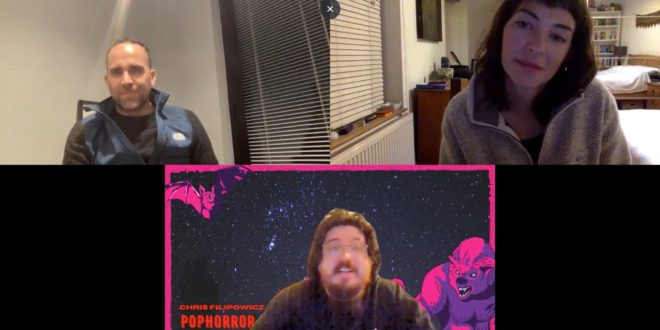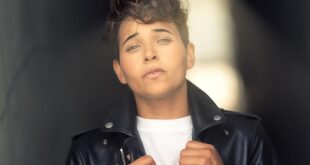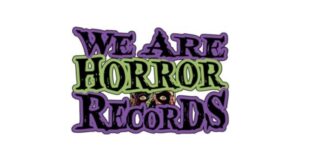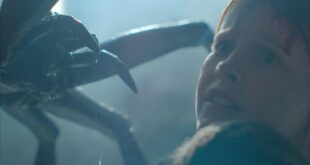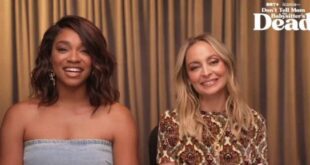Recently, we were given the opportunity to speak with director Lee Haven Jones and lead actress Annes Elwy from the new eco-horror film, The Feast. The film comes straight from Wales and is immersed in their folklore. Read our exclusive interview here or check out the video link at the bottom of the page! Both myself and fellow PopHorror writer, Tori Danielle, enjoyed the film (review here) and especially recommend it for the performance of Annes Elwy.
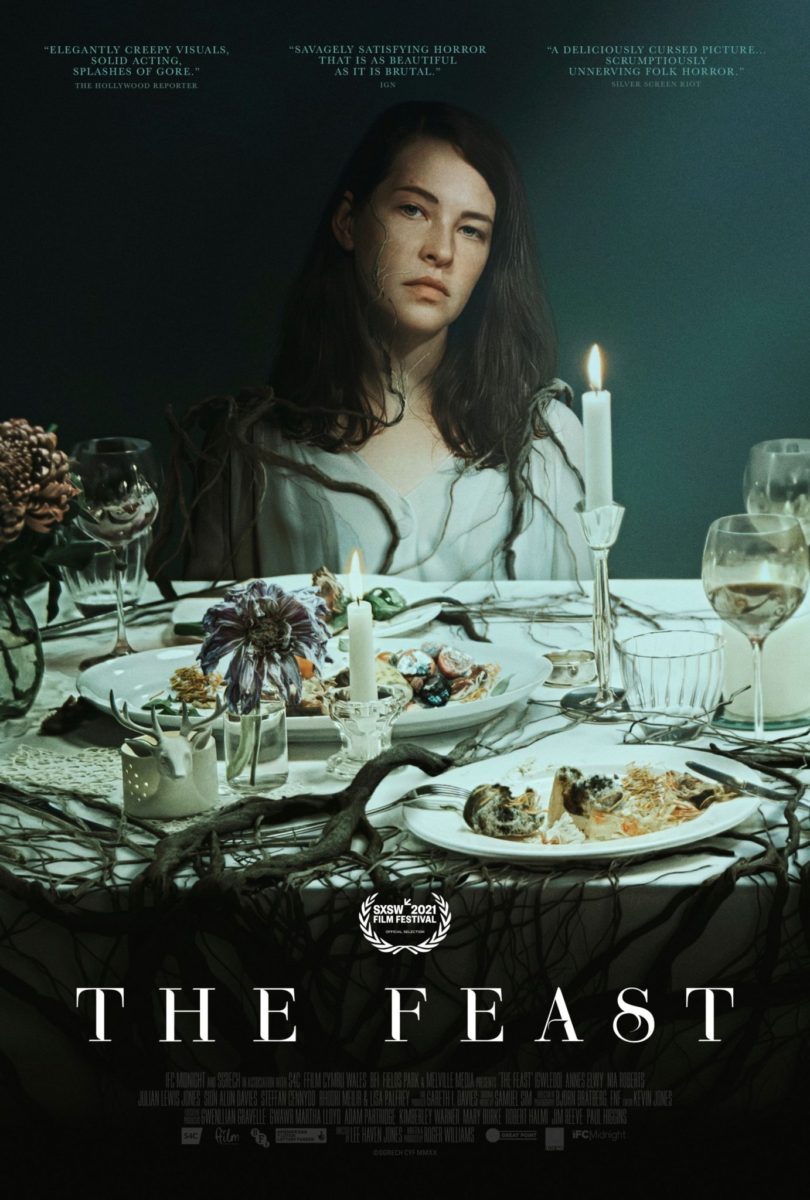
PopHorror: This last year has featured a lot of eco-horror and green horror films like this like In the Earth [PopHorror review] and Gaia [PopHorror review]. Would you count The Feast as one or the other?
Lee Haven Jones: It’s both. Absolutely. It is a film about a contemporary morality tale in many ways. It draws on folk legends and myths, so it very definitely checks the folk horror box. But I guess that’s the culturally specific element of the story. Welsh myth is very definitely in the DNA of the piece. But also in terms of the universal story, it is about a warning. And in the blood-soaked conclusion of the piece, it says that this fragile planet on which we live will someday take revenge on us for the devastation we cause. So yes, it’s folklore. And yes, it’s eco-horror.
PopHorror: Okay. Yeah. And I loved that finale, I don’t want to give away too many spoilers, but I loved that green message, that we’ve got to find symbiosis with the earth rather than parasitism.
Lee Haven Jones: Yeah, absolutely. It’s interesting, isn’t it? We made it in 2019, but it feels even more relevant and timely now in the advent of COP26 [the 2021 United Nations Climate Change Conference]. And the fact that this message is one on the climate crisis is very much on the agenda. And it’s interesting, isn’t it? How you make something and it feels urgent, but then when you see it two years down the line, it’s even more urgent and even more prescient.
Annes Elwy: Also, after all the lockdowns that we’ve had worldwide where aviation stopped and transport stopped, you noticed how quickly nature started to recover and how animals returned. And how the sound of the birds was so much more prominent than it used to be. And you have in the film that nature will dominate. And even if you might have noticed the flies in the film, that gives it a whole element that actually says we are in nature’s place. It’s not ours, and we’re not there to control everything. We have been welcomed here. We are under nature’s power. And yet it’s interesting, because it is very timely. It’s the oldest story that’s ever been told, the battle between nature and culture. Between Apollo and Dionysus, as I keep on saying. It’s sort of Greek. It’s about a battle between two forces. And most most fairy tales, for example, are precisely that.
PopHorror: I don’t remember who said it, but I remember in a writing class I took where someone mentioned that there are three stories: man versus nature, man versus man, and man versus himself.
Lee Haven Jones: Yeah.
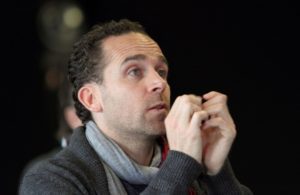
PopHorror: So this is very solid iconography.
Lee Haven Jones: Absolutely.
PopHorror: I do see that this is your feature debut. Were there any parts of production and directing film that caught you off guard or were extra challenging?
Lee Haven Jones: Challenges? I’ve been around the block a few times. A lot of people say that directing television and directing film are significantly different. And, of course, they are different… but there are similarities. So I knew the nuts and bolts. The one element that I found most challenging was the freedom of it. Cinema is very definitely a director’s medium, and there’s an expectation that you will, as a director, bring your vision to bear on the material. That freedom after coming from a background where you have lots of executive producers in television steering you in the way that they want to see you go, having that freedom was quite immense. Overwhelming at times at first, but then once I embraced it, I absolutely loved the the liberty that it afforded me as an experience, really. It’s a real joy to be able to play as we did on set every day and create something that is not run of the mill that traverses tones effortlessly in a way. This is a strange little beast, a bit like Cadi [Annes Elwy’s character], I guess? And I just I love that.
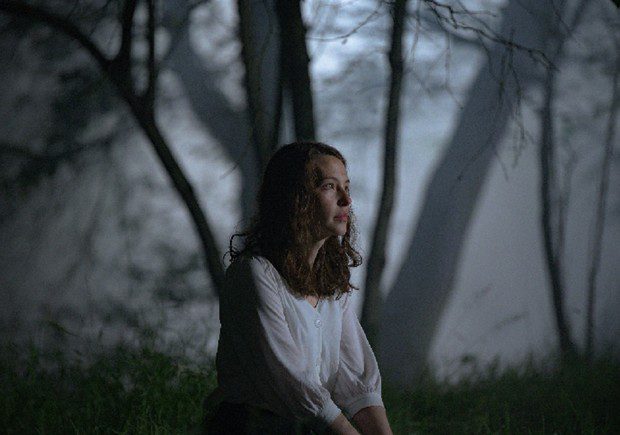
PopHorror: On the note of Cadi: Annes, your character is very unique, vacillating between observer and judge of the family. Did you have any specific inspirations for how you went about playing the role?
Annes Elwy: I didn’t really take anything directly. I just knew that she was a force of nature and that she wasn’t fully human. But she wasn’t fully nature either, as you know. She was a human embodiment. And so I just began thinking of what she feels like in the space, how she feels in this very alien structure. When she’s at home laying on the grass, that’s where she feels like she gets her power, and that’s where she’s at her strongest. But she has to carry that through and come into this house. And actually, I just liked the freedom that Lee felt as a director. I felt playing a character that didn’t have social constructs to abide by, she wouldn’t feel the need to be funny or impressive or clever. She is just herself. I compared her earlier to a child how she behaves instinctively. And she will look at someone for as long as she wants to look at someone, and she will take in that painting on the wall for as long as she needs to. And then she can let things go. She’s a very free character. That made me feel very relaxed. And I felt at home making her even though initially when I read the script, I had no idea what she would be, really.
PopHorror: Yeah, I can’t imagine the mental processing to get ready for the role, because it is such a instinctual and primal character.
Annes Elwy: So, I think a lot of that just came from being on set. You can’t really prepare yourself to take things in for the first time. But when you have all these things in front of you, it’s a very tactile space. You are just taking things in for the very first time. You’re tasting things for the first time, and you’re hearing things, and you’re looking at all these people with all their quirks, and you’re seeing them as if you’ve never seen a human before. So then it didn’t really take any effort from me, because I just had to just allow myself to be new in the space.
PopHorror: Yeah. Be open-minded and open-eyed.
Lee Haven Jones: Seeing things things for the first time… I think that’s the key to the character, isn’t it? She has no experience of this. And I think that’s what Annes does beautifully is to lead us through as an audience all of those sensory experiences she has and allows us the space to project our own feelings and thoughts about these experiences onto her. It’s a really simple yet complex performance, which I think is a hard thing to pull off.
PopHorror: Yeah, it was, but frankly, I feel Annes nailed it. It was a very unique performance.
Lee Haven Jones: It really is very good!
PopHorror: I want to mention that, since I’ve seen a lot of eco and folk horror this year, and Annes’ performance is definitely going to be one that just lingers in my brain and haunts me in a good way.
Lee Haven Jones: That’s good. That’s good. Just to give you an insight into the casting process… she was the first choice. I collared her at an awards ceremony, and she agreed, so that’s good. My good fortune, our good fortune.
PopHorror: Oh, definitely. Our good fortune, both yours and us in the viewing audience. As I’ve already mentioned with both class and environmental commentary, the film seems to have a lot to say. This is an open question to both you. What would you say is the ultimate theme or message audiences should be taking away from The Feast?
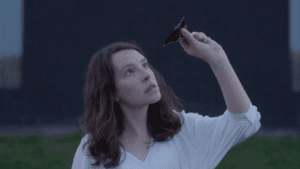
Annes Elwy: You go first, Lee.
Lee Haven Jones: There’s so much in here I think. In a way, it’s very specific about Welsh history, and our relationship in Wales to the land, and what we’ve done to the land, and the way we’ve exploited the land. So it’s singularly Welsh in that regard. There’s very definitely an environmental message which takes hold towards the end, the way that we abuse our planet. There’s also lots of humor in there, a dark, twisted kind of humor. And, there’s the social commentary, of course. Plus on top of that, you have all the horror moments. Some are explicit, yes, although it’s not that sort of explicit slasher-type horror. It’s more of a psychological sort, a creeping dread. I think that that takes us through the film, and it hits you on a psychological terror level. So hopefully, it has a little bit of something for everybody. It should get a good wide, broad audience because of that.
Annes Elwy: It’s obviously quite a slow film. It gives you a lot of time to sit with your own role in how you behave in your land, and what your priorities are. I think it has a lot to say. And obviously, we are all now aware that we should be doing things with an eye on what we leave for generations to come, because we all have that responsibility. None of us are perfect. So, I don’t think that people would watch it and feel personally judged. But I think they would come away feeling reminded of the bigger picture and how easily we can be distracted by things like money and other things that don’t really matter at all. But we can be told over and over again that those are the things that matter. You should have a nicer house, and you should have matching glasses and things. And I think people will come away with a more balanced idea of their place. Hopefully, they will have just enjoyed a bizarre little horror and will come away with more of a sense of Wales and Welsh and things. They’ll have a new experience, and it gives a platform to Welsh film and the Welsh language. I think that’s an exciting prospect for all of us.
PopHorror: It is. I wanted to say this is probably the first Welsh horror film I’ve actually seen, and it was nice to be immersed into that culture. Like Annes said, it’s not a judgmental film, but it’s almost like a fairy tale parable. It reminded me of the uncensored original Brothers Grimm stories.
Lee Haven Jones: Yeah, that was a source of inspiration for us. I describe it as a contemporary morality tale. And I think that’s very strong in it. It does provide—forgive the pun—food for thought, but also it does pack a punch and is a sort of a visceral injection to the senses, I hope.
PopHorror: Yes, very visceral. I don’t want to spoil for those who haven’t seen it, but there are definitely some moments that, even though I’m pretty desensitized to horror and I was just like, “Oof.”
Lee Haven Jones: (chuckles) Good. That’s good.

PopHorror: Before we run out of time, I’ll ask one last question. You mentioned the Welsh in the film’s DNA. Why specifically Welsh culture and folklore?
Lee Haven Jones: Because we are Welsh. Annes and I and all the cast and Roger [Williams] the writer, we were all Welsh, and we all speak Welsh.
PopHorror: Everybody? So then no one had to be trained to learn or anything?
Lee Haven Jones: No, no, no. I’ll just give you a very brief idea of how it is in Wales. There are about 600,000 Welsh speakers in Wales. And within that, it’s quite a performative tradition. So we have some rather fabulous singers and actors. There’s a really significant and talented pool of Welsh actors who work through the medium of the Welsh language, of which I was fortunate to have the cream of the crop.
PopHorror: Seeing the film, it seemed so because performances were amazing.
Lee Haven Jones: Yeah. All the actors have either spoken Welsh since they were born or were taught Welsh from the age of three or thereabouts. So yeah, it’s a first language for everybody, actually.
Annes Elwy: I think it’s quite intriguing, the surprise there that we were all Welsh speaking. Quite often when you’re filming things in Welsh at the moment, there’s still that feeling that the rest of the world won’t want to hear it if it’s in Welsh, so you film it twice. And so the rest of the world will watch the English version, even though we’ve already filmed a Welsh language version. And it’s bizarre that tradition is trending, because we’re so open to watching foreign language productions. And I think that was partly why I was so excited by the script because it wasn’t going to just bow down to that idea that English will make it more interesting and just embrace the fact that we live in a country and we speak a language, so why not act in our language and create stories in our language and spread them? Share them with the world, who I’m sure are much more open to hearing things in Welsh than we have given them credit to.
PopHorror: Yeah, I’d say it worked. It helps give that mythic folklore sense just having it be truly in your Welsh language, and not like a Bible story being in English accents rather than the native language.
Annes Elwy: [Welsh] sounds very different than many other languages. So I think especially for a horror, I’m sure it will start people off feeling unsettled from the beginning, because there’s nothing familiar for them to latch on to.
PopHorror: Like Cadi! They’re alien in that world.
Lee Haven Jones: Exactly.
Annes Elwy: Exactly.
PopHorror: All right. I think I’ve gone over on time already. So I just want to say thank you so much for this. I love the movie. And like I said, though, I’m pretty desensitized. It had some pretty gnarly moments, and I enjoyed watching it.
Lee Haven Jones: Well, thank you.
PopHorror: Yeah. Thank you. I hope you have a lovely day, and thank you again for your time!
Lee Haven Jones: Thank you so much.
The Feast is now available in theaters, digital, and VOD from IFC Midnight!
Link to the video review below!
https://www.youtube.com/watch?v=1pBe0195g3Q&ab_channel=CinematiChris
 PopHorror Let's Get Scared
PopHorror Let's Get Scared
